The content of the article
From birth, the child does not have the skills, he only has reflexes. He cries and asks to eat when he is hungry, pisses when he wants it. Over time, he begins to control his needs and restrain urination for a while. After a year, some parents begin to accustom the baby to the potty. Toward the age of two, most children consciously ask for a toilet, know how to restrain themselves and write where it is supposed to. For some time, the baby urinates only at night in a dream, and then it passes. But sometimes some kind of malfunction in the body does not allow the baby to overcome this threshold. A child can write at night in bed and 4, and even at 6 years. How to deal with this? What needs to be done?
Enuresis
Urinary incontinence is mainly called night-time enuresis. Up to 5-6 years, such incontinence is considered normal and often does not require the help of specialists. This is due to the immaturity of the nervous system. That is, when a child is sleeping and his bladder is full, his brain does not receive a special signal for awakening. In the vast majority of cases, this disappears after 6 years. As for babies of three years of age - among them enuresis is observed in 40% of children. This is not such a rarity, so there is no need to focus on it.
Causes of nocturnal enuresis
It is important to understand that bedwetting is a symptom, not a disease. To get rid of it, you need to understand the cause of enuresis.
- Nervous immaturity. This is the most common cause of bedwetting, but it is not a pathology. The child begins to control the act of urination after six months, but may not be able to do this until 4-5 years old. This can be caused by some neurological diseases, birth injuries, problems in the prenatal period. Urinary incontinence is more likely to affect boys; in girls, the ability to control the urethra develops faster. Enuresis can be a concomitant symptom of epilepsy, autism.
- Diseases of the genitourinary system. This is due to the fact that the child is simply physically unable to restrain urination. Often this is a consequence of infections, cystitis, pyelonephritis, the characteristics of the individual structure of the urethra.
- Mental and emotional factors. If a child has experienced severe fear, irritation, stress, urinary incontinence may be the result of emotional shock. Factors such as a quarrel between parents, moving to a new place, the death of a loved one, the loss of a pet, and harsh punishments can play a role in this. Often nocturnal enuresis occurs in emotional and sensitive children who take all the surrounding events to heart.
- Endocrine diseases. With diabetes, the child drinks a lot and often. His bladder stretches over time, and nerve endings lose their sensitivity. Sometimes the child simply does not feel that the bladder is full and it is time to go to the toilet.
- Sleep disturbances. If the baby has too much sleep, which cannot be interrupted by weak neurological impulses, he also writes to bed.
- Heredity. The likelihood of enuresis is increased if the child's parents had similar problems in childhood.
To identify the cause of the disease, you need to see a doctor. When making a diagnosis, he will prescribe medication. If cystitis is the cause of incontinence, antibiotics will be used. If the baby is written from nervous experiences, most likely he will be prescribed sedatives.
How to wean a child to write in bed
If your baby writes in bed, this is not a reason for ridicule, shame or punishment. Remember that the child is not to blame for the fact that he writes - he can not restrain this process! There should be a trusting relationship between parents and the baby, do not put pressure on the child. Here are some guidelines to help you reduce nightly urination.
- No need to give your child a lot of fluid at night. This, of course, leads to the fact that the baby is described in bed. It is best to give him a drink no later than an hour before bedtime. And before going to bed, be sure to drop it on a pot.
- You do not need to feed your baby cold or dairy products at night, this also provokes urinary incontinence. No salty, greasy or fried foods that cause thirst.
- Before going to bed - no cartoons, active games, gadgets. Nervous experiences and vivid emotions lead to overexcitation of the child, which is the cause of the failure of the nervous system.
- Various types of physical activity strengthen the walls of the bladder. Let the child move more, play sports. Movement also contributes to the rapid maturation of the nervous system.
- Kegel exercises are very effective. For children, of course, it will be difficult to explain the principle of their implementation, but older children may well do them. The principle is as follows. During urination, you need to use a muscle to stop the flow of urine for 10 seconds, and then resume it again. This should be done several times, the more often the better. This is how the muscle responsible for the retention of urine is trained.
- Perhaps the child is simply afraid to sleep alone in his room. Consider moving his bed to your bedroom for a while. If this is not possible, be sure to leave the included nightlight before bedtime. Do not close the door so that the baby does not get scared, invite him to sleep with his favorite toy so that he will not be afraid.
- Some foods can stimulate the nervous system and lead to urinary incontinence. Exclude caffeinated foods before bedtime. No chocolate, cocoa, Coca-Cola.
- Perhaps the child writes to bed at night, because he is cold? Try raising the room temperature. Wear long sweaters and sweatshirts before going to bed so that at night the child does not open the lower back.
- Sometimes it happens that the oldest child 4-5 years old begins to write after the baby appears in the family to make up for the lack of parental attention. It is very important to show the baby that he is still loved and appreciated.
By following these simple recommendations, you will notice that incontinence incidents will occur less frequently. And soon your baby will be able to sleep dry all night.
Wake or not wake
There is much debate about whether to wake up the baby at night, so that he went to the potty. The fact is that when we awaken a child several times a night, we injure his psyche even more. In addition, the baby will not learn to feel this moment when you need to wake up and go to the potty. It is better to leave the child sleeping soundly, and when he is described, just change his bed and clothes.
Another thing is when the child begins to tossing and turning before urinating, but does not finally wake up and writes to bed. In this case, you just need to help the child’s nervous system and wake the baby at this moment. Lift the child and certainly put him on the potty.
What to do if a child writes in bed at night
First you need to understand that only 1% of children who write are suffering from some serious illness that requires treatment. In other cases, nocturnal enuresis is not a pathology. You just need to go through this time, waiting for the baby to start waking up on the pot himself.
Before going to bed, prepare all the necessary things that you may need - clean bedding, removable pajamas. There should be a waterproof cover on the mattress.If the baby has described, you will just need to remove wet clothes, wipe the mattress and lay a dry sheet. The child should be rinsed or wiped with a wet towel, put on dry clothes and put to bed again.
No one in the family should mock the child’s nocturnal enuresis. Ask older brothers and sisters not to focus on this. You can ask the child to change their bed after an accident at night. So the baby will be able to hide the embarrassment in front of the parents. However, if the baby does not want to do this and perceives it as a punishment - do not insist.
Bedwetting is temporary and does not require any special treatment. In most cases, enuresis disappears without a trace even before adolescence. Help your child survive this moment, and everything will be fine.
Video: how to teach a child to potty

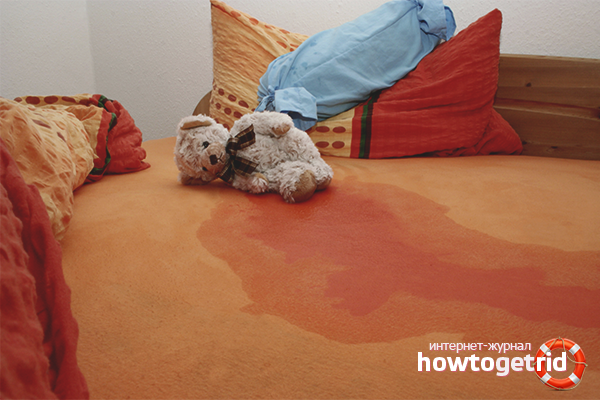
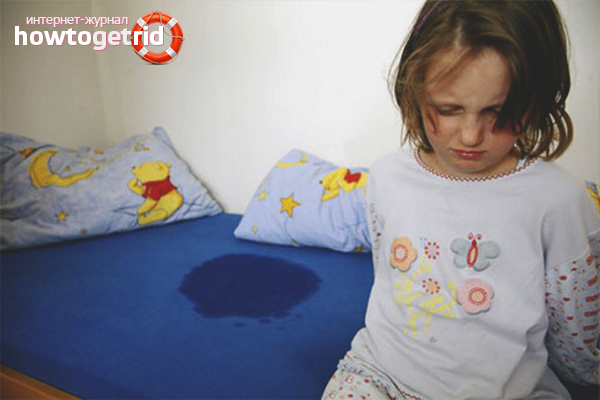


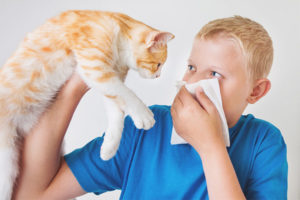


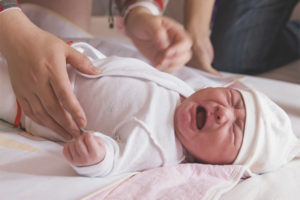
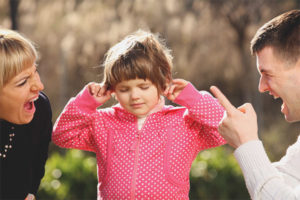
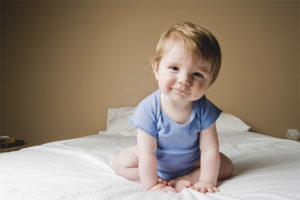
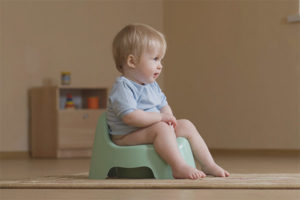
Submit